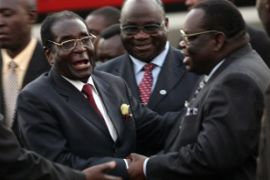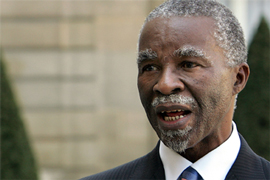African summit to discuss Zimbabwe
Southern African leaders meet in Zambia to find ways to deal with Zimbabwe crisis.

| In video | ||
|
The country is experienceing massive hyper-inflation. Basic goods such as bread, meat, and milk have been in short supply in Zimbabwe since
Mugabe ordered shops to halve prices in June.A steady stream of Zimbabweans is flooding into neighbouring South Africa and other countries, pressuring regional economies.
At the same time, Thabo Mbeki, the South African leader, has been mediating talks between the ruling Zanu-PF and the main opposition party.
Mbeki s expected to assess the progress of these talks at the summit.
Viable economy?
Tomaz Salomao, the executive secretary of SADC, said on Wednesday that the group had a number of options that included a “hard line”, “quiet diplomacy” or a “different” method.
He did not say what the grouping intended to do about Zimbabwe, saying that it would be premature to speak before the summit studied its options.
However, after meeting many Zimbabwean businesses, institutions and public enterprises, he concluded that the country’s economy was still viable.
Zambia’s first president, Kenneth Kaunda, a firm supporter of Mugabe told Al Jazeera that Britain was to blame for Zimbabwe’s problems.
“No one should demonise Mugabe,” he said.
“The British government should stop organising the US and Europe against Mugabe.
“The SADC has not intervened and you can’t expect the government to sit and wait while the opposition misbehaves.”
Mbeki report
A senior Zambian official said SADC had grown tired of the deepening
political and economic crisis in Zimbabwe, but added that he did not have a resolution.
“We are fed up with the crisis in Zimbabwe and we want it resolved,” the official said.
 |
| Thabo Mbeki is due to submit his report to the summit on Zimbabwe [AP] |
“SADC’s credibility as a real force for change on human rights is on the line here and its leaders should insist on tangible improvements in Zimbabwe.”
Peter Takirambudde, Human Rights Watch’s Africa director, said: “SADC members must take strong and effective action to deal with one of the region’s most grave crises – Zimbabwe.”
Takirambudde urged the group to send human rights monitors to the country.
‘Violent opposition’
Patrick Chinamasa, Zimbabwe’s justice minister, told Zambian state television that quiet diplomacy, spearheaded by Mbeki, might not pay off.
He alleged that opposition groups were carrying out violent attacks on civilians and security forces.
“There can be no justification to make us [engage in] dialogue,” he said.
“They are only interested in getting into power through unconstitutional means.”
Zimbabwe’s divided opposition groups, as well as the US and Britain, hope an economic squeeze will weaken Mugabe after 27 years in power.
Zambia was the first African country to openly criticise Mugabe, saying the country was “a sinking Titanic”.
Levy Mwanawasa, the Zambian president, has since toned down his position.
